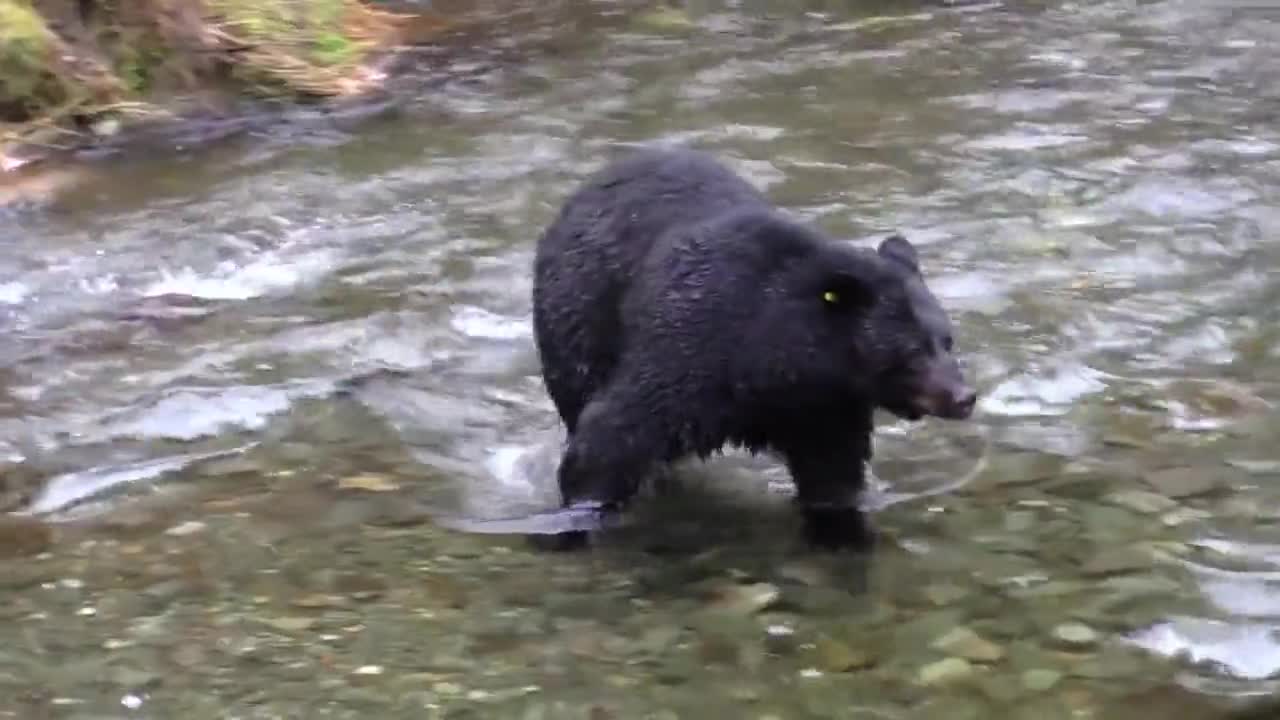Premium Only Content

Bear catches fish in river
In this video a Bear is catching fish in river and playing in the river. Guys plz like share and subscribe if you happy with our video.
very summer, the salmon run, when the fish moves from the ocean to the rivers of Alaska to breed, is an event eagerly awaited by grizzly bears returning from five to seven months of hibernation.
Salmon splashed in the streams and grizzly brown bears were waiting to catch and devour them. Bears have been demonised in tales, but the reality is different. The grizzly bear, also known as the North American bear, tolerates human presence in wildlife sanctuaries, like any big cat predator.
Alaska is the largest State in the United States, a hiker’s heaven of snowy wilderness, mountains, greenery and volcanoes. Half of the State is snow-covered. The U.S. purchased it from the Russian Empire at a cost of $7.2 million in 1867. It is the only non-contiguous State of the U.S. and has a maritime border with Russia.
In Alaska, in summer (June to August), the grizzly bears wade the lakes and glacially fed streams in their hundreds to hunt salmon. The salmon is a cold-water fish native to the tributaries of the Pacific and the Atlantic oceans, and every year they move upstream from the Pacific to the freshwater streams of Alaska to breed. “It looks like a thrilling sports event when the bears go fishing, compete with each other, quarrel, rub shoulders, splash water and make it a merry and noisy affair,” said Nigil Haroon, a doctor from Kerala who is based in Toronto, Canada. He is a prominent wildlife photographer who visited the Katmai National Park and Preserve in Alaska in July 2019 to watch the bears hunting salmon.
He narrated his experiences to this writer. “Katmai is a famed global wildlife destination. The bears plunge into the waters with their mouths open, chase the fish, thrash the water surface with their paws and swim frantically after the salmon. Some bears submerge neck deep in water to monitor salmon movements. Some others balance in the strong current. It is a visual experience.”
In summer, when the Alaskan streams abound with fish, the bears eat salmon voraciously, sometimes up to 25 big fish a day. During the other seasons, the bears sustain themselves by eating berries, grass and vegetables.
Nigil Haroon was on an observation platform with many other photographers when he sighted a few massive bears in the Brooks waterfall. An alert bear was watching the salmon leaping against the torrents. The bear meticulously calculated the movement of the salmon and, like an adroit goalkeeper, tightly gripped a salmon virtually leaping into its wide-open jaws. The frightened salmon tried to wriggle out, but the sharp teeth of the bear clamped it tight.
Summer is virtually a feast time for the bears, when they eat a lot of salmon to store enough fat for the following winter months and to prepare for hibernation, a state of dormancy or winter sleep. In Alaska, the bears hibernate for five to seven months, depending upon their sex, region and the extent of winter.
Nigil Haroon said that one had to apply two years in advance to book a hut in the Katmai National Park. U.S. citizens are given preference. The applicants are selected by lots. At any given time, more than 100 persons are not allowed inside. Stay options are costly, but food and services are very good.
To photograph the bear hunt, one has to go rather close to the bears, within 50 feet (15 metres) or so. The bears are unconcerned about the presence of people. An internationally renowned bear expert, Dr John Hechtel, whom this writer contacted on email, said that the “bear is used to human presence. It is tolerant of people as long as it does not obtain any human food or garbage.” Hechtel has worked in Alaska’s Department of Fish and Game and has observed the bears for over three decades. He has studied Arctic bears, using radio collars. Once, an excited wildlife photographer inadvertently came face to face with a massive bear. But the bear receded. The photographer quipped: “The bear is a gentleman. I felt his fur brushing my body.”
Many bears move in groups. When bears splash the streams, the salmon shoals are disrupted. Some bears, thrilled to see the salmon, may run about excitedly. But there are a few stalwarts, the dominant ones, who stand steadily in the current watching the salmon like robots, confident that the leaping salmon will not escape their powerful jaws.
The more salmon a bear catches, the more greedy it gets. The bear is not fed up of eating salmon. Often, a bear may jump with joy at each catch. Nigil Haroon said their excitement, observed through binoculars, is often visible in their faces.
The experts can be seen at different spots of the waterfalls. They are not troubled by any other bear intruding into their territory. Some of them are adept at cutting the head of the salmon by placing it on a rock. They separate the head of the fish and swallow it with relish. With their paws, they pull out the eggs from the stomach of the salmon. The bears especially like the eggs.
The eminent U.S. wildlife biologist Douglas Chadwick, who has conducted extensive surveys on grizzlies, says that they are playful, inquisitive and keenly intelligent. He quotes Charles Robins, a professor at Washington State University and an expert on bears, to say that grizzlies are smarter than dogs and perhaps as bright as young children.
The summer of 2019 was different in Alaska. The waters were incredibly warm. The salmon were unable to take the heat stress and countless salmon were found dead floating in many streams. Deaths have occurred in previous years, too, but the scale was rather unprecedented this year.
A U.S. government agency, the National Ocean and Atmospheric Administration, announced that July 2019 was the hottest month ever recorded in Alaska. The temperature in Alaska rose to 81.7 °F (27.6 °C) while the previous high was 76 °F (24.4 °C). The salmon deaths were widely reported by U.S. TV channels.
Rick Thoman, an Alaska climate expert working with Alaska University’s International Arctic Research Centre, made available to this writer an important document on Alaska’s changing environment. In an email to this writer, he said: “Temperatures in Alaska have been consistently warmer than at any time in the past century. The warming varies greatly across the State. The oceans around Alaska are now regularly warmer than at any time in the past 150 years, affecting everything from algae to fisheries and human health.”
What will be the impact of this on the salmon? Hechtel says there are a number of ways weather can endanger salmon. High temperatures can prevent the salmon reaching spawning areas and result in their death. The salmon run, when salmon migrate upstream to spawn, is vital in the food chain of the grizzlies. Lack of salmon runs can impact bears who may not accumulate enough fat to see them through the winter. Serious studies are in order, he says.
-
 1:40:14
1:40:14
TheConnieBryanShow
4 days agoGAIN OF FUNCTION: MRNA, D.A.R.P.A. & THE PFIZER PAPERS
10.3K4 -
 2:14:01
2:14:01
Fresh and Fit
7 hours agoDr. Disrespect Moves To Rumble!
60.4K31 -
 6:14:53
6:14:53
Akademiks
9 hours agoDrake Sued his Label for Botting Kendrick Lamar Streams to 'End Him'. Kendrick Drops new video!
64.4K12 -
 0:46
0:46
Dr Disrespect
15 hours agoIt's not just a stream... it's an experience
333K1.74K -
 5:45:38
5:45:38
80sKiid
10 hours ago $29.32 earnedFirst stream on RUMBLE!!!!!
99.5K5 -
 3:56:31
3:56:31
JakeParker
10 hours ago $14.36 earnedJakeParker is LIVE on Rumble
57.3K -
 8:09:23
8:09:23
SpartakusLIVE
11 hours ago $26.76 earnedThe Duke rallies squad for LAUGHS into the night with a SMATTERING of TOXIC banter
90.6K17 -
 1:03:51
1:03:51
Flyover Conservatives
1 day agoGeneration Z’s Revolution: 17 Year Old Author on the Return of Faith, Family, and the End of Feminism - Hannah Faulkner; Economic Update - Dr. Kirk Elliott | FOC Show
51.6K2 -
 1:12:43
1:12:43
Adam Does Movies
14 hours ago $21.15 earnedMoviegoers Are Singing Now! + Lilo & Stitch + Sonic 3 - LIVE!
85.7K7 -
 1:26:05
1:26:05
Donald Trump Jr.
17 hours agoRegime Media Imploding: What’s Next for MSNBC? Plus Michael Knowles & Alex Marlow | TRIGGERED Ep.194
237K245